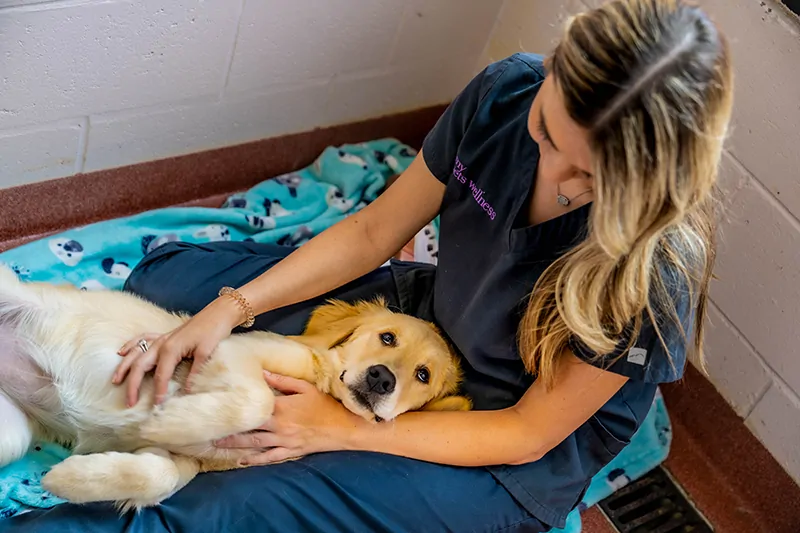
Detect illnesses & medical abnormalities that may otherwise go unnoticed through routine diagnostics.
Routine diagnostics help your vet understand your pet’s unique health chemistry in the event of unexpected changes.
Maintaining regular healthy habits and vet check-ups can significantly extend the life of your pet.

Maintaining regular healthy habits and vet check-ups can significantly extend the life of your pet.
Pet wellness care is a key element of providing a healthy lifestyle for your furry companion. Your pet can't tell you how they are feeling and concealing injury or illness is common animal behavior. That's why pet wellness care exams are so important because they give your vet an opportunity to establish your pet's baseline of health and look for signs of developing health conditions.
The best way to protect your dog or cat from serious illness is to provide them with regular pet wellness care because it promotes early detection which, in turn, improves treatment outcomes. My Pets Wellness provides a full suite of pet care services including wellness check-ups, preventative vaccinations, parasite protection, routine diagnostics, and regular dental care.
Your pet's wellness care check-up involves an assessment of your pet's overall condition and a detailed, nose-to-tail examination. During the wellness check-up, your veterinarian will assess your pet's:
Your pet's wellness check-up is the perfect opportunity to tell your veterinarian about any concerns you may have regarding your pet's health. Your vet may also offer pet care education or advice that will help you keep your pet healthy and feeling great.
One of the most important aspects of your pet's wellness care is staying current on all core vaccinations. Pet vaccinations prevent many avoidable illnesses that are harmful to dogs and cats and reduce the need for urgent veterinary visits. When you first bring your pet to My Pets Wellness, we check their vaccination records and put them on a regimen to ensure that they stay current on core vaccinations.
Different vaccination regimens are needed for different life stages, lifestyles, and environments. You can bring your cat or dog in as early as six weeks for vaccinations that may include:
After your pet has its first vaccinations, you will need to bring them back for boosters every 3-4 weeks until four months of age, then for another booster at a year of age, and boosters every one to three years thereafter, depending on the vaccination. Proof of current vaccinations is required to utilize boarding, grooming, and daycare services for your pet.
Intestinal parasites, fleas, ticks, and mosquitos can cause a number of dangerous and potentially fatal illnesses. Pet parasites can be difficult to see as they can conceal themselves under your pet's fur or in their internal organs, and some are so little they are just the size of a pinhead, making them incredibly elusive. Common pet parasites include:
The experienced veterinary team at My Pets Wellness will thoroughly examine your pet for signs of external pests and internal parasites. Our knowledgeable veterinary physicians can prescribe medications that prevent and treat intestinal parasites, heartworms, fleas, and ticks. We work with you to safeguard your pet from disease-causing parasites, which also helps to protect you and other members of your family.
Routine diagnostic testing is part of pet wellness care because it can reveal developing medical conditions that aren't causing symptoms yet. Some wellness screening tests that your vet may recommend are:
Since many puppies have intestinal parasites, regular fecal exams in puppies are crucial. Additionally, your veterinarian may advise heartworm testing on a timetable that is suitable for your part of the country.
Maintaining excellent pet wellness care requires good dental hygiene. By the time they reach 3 years old, most pets have some sort of dental disease, but with the right treatment, many periodontal issues may be prevented.
My Pets Wellness' veterinary physicians are also skilled veterinary dentists. Veterinary dentistry refers to the cleaning, repairing, adjusting, and extracting of your pet's teeth to promote oral health.
Veterinarians are uniquely prepared to diagnose, treat, and provide follow-up care for dental conditions found during oral examinations and operations.
Routine veterinary dental exams and cleanings prevent dental disorders from developing, lessen the need for extractions, and lower the risk of periodontal disease. To preserve your pet's oral health at every stage of life, My Pets Wellness utilizes the latest dental tools and technology available.
While My Pets Wellness is happy to provide everything you need for veterinary pet wellness care, there are many other things you can do for your pet's wellness. The best way to manage your pet's at-home wellness care is to make it a consistent part of your daily routine. Excellent at-home pet care includes:
You can also rely on the services of our pet care professionals for assistance with providing proper care for your furry companion. Many My Pets Wellness locations offer full-service grooming and nail trimming by professional groomers and doggy daycare services for exercise and socialization.
Phone: (855) 461-8259
Email: [email protected]